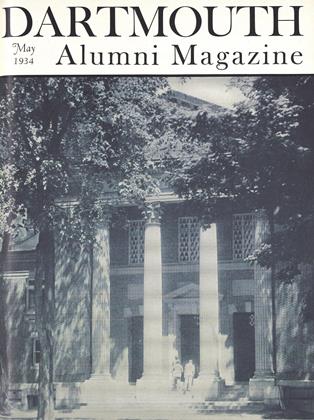The following editorial, titled "Freedom at Dartmouth," appeared in the Boston Herald April 6th:
The leading article in this month's Dartmouth ALUMNI MAGAZINE is doubtless causing many a loyal graduate to rub his eyes,re-affix his spectacles, and then, seeing thathe was not mistaken on the first reading, toutter a few round oaths. The piece is entitled, "Repudiation of the Old College,"and is contributed by Charles B. Strauss '34,editor of the Steeplejack at Hanover.
Young Mr. Strauss maintains that "theliberal college as the alumni knew it" isdying; that it is being repudiated throughthe collapse of the civilization of which itxvas a fruit; and that many college men nowrealize "that the crisis in economic life andthe crisis in culture, far from being unfortunate accidents that have damagedcontemporary life, are the direct and inevitable results of capitalist economic thoughtand practice." He concludes with the challenging assertion that "until cm international communal order is achieved, theluorth of the college will be tested by thenumber of radicals it contributes to society."
Hear, hear! Heresy in Hanover! Somegraduates will doubtless demand that Mr.Strauss be sent back to Moscow. Others willblame his Culminations on the subversiveinfluence of Orozco's queer frescoes in thecollege library. Still others will ask theresignations of the editors of the ALUMNI MAGAZINE for printing such rot! But thevery fact that Mr. Strauss is permitted topursue his heterodox ideas at Hanover andthat the graduates' magazine gives prominence to his views is, it seems to us, a striking refutation of his thesis, and strongproof that the liberal college, as exemplified by Dartmouth, is still very much aliveand serving a useful purpose. Althoughfreedom of thought and speech may seemantiquated in these days of fascist or communist absolutism, it is a heritage whichNew England institutions are duty-boundto cherish. a
Administrative circles have been delightfully augmented within the month by the addition of three offspring. Jonathan Strong, whose father is Dean of Freshmen Bob Strong '34, was born April 6. Joanna McCarter, born April 18, has for her father one Herr Wm. McCarter 'l9, assistant librarian of the College and contributing editor of this publication. And to the fireside of A 1 Dickerson '3O, executive assistant to President Hopkins, has come Little Inskip Jr., bom just the other day, April 22.
Congratulations of Gradus this month go to Alex Laing '25 on his receiving a John Simon Guggenheim Fellowship for creative writing abroad. Alex says he plans to leave Hanover this summer and do some more or less extensive traveling unless he "gets stuck on a desert island." We'll be looking Cor another fine novel like The Sea Witch after a while.
And congratulations to Charles Edwin Odegaard '3a on the awarding to him of the Woodbury Lowery traveling fellowship from Harvard. ***
—And also to Halsey C. Edgerton 'O6 on his marriage to Ada Lorraine Sniffen of Hanover. Mrs. Edgerton had been employed for some years in Max Norton's office. There was some talk of having Halsey apprehended on his honeymooning in Bermuda for having absconded with assets of the bursar's office. ***
The class of 1907 may well be pleased with the memorial erected to one of its group up in the White Mountains. At Peckett's on Sugar Hill, near Franconia, N. H., stands a beautiful, simple building housing a library for the use of hotel guests. It stands in memory of "Nick," known throughout the North Country as a pioneer skier, hiker, woodsman. Albion Ross Nickerson graduated in 'O7 and went from Hanover to Franconia where he joined Robert Peckett in working on the unique project that is known throughout the country as "Peckett's." There isn't any other place quite so delightful. The rambling farmhouse was built by Mr. Peckett and Nick into a large, renowned country home where one is privileged to vacation, summer or winter, in complete comfort. Walter T. Lundegren 'si, whose sister married Nick, spoke recently of two Philadelphia people who went to Peckett's for a skiing week-end and stayed 74 days.
Some of Nick's friends thought so much of him that when he was instantly killed in an electrical accident in 1926 they made the little library from old pine collected from neighboring farms. Over the rugged mantel is a bronze inscription:
The still North remembers him,The hill winds know his name,And the granite of New Hampshire
 View Full Issue
View Full Issue
More From This Issue
-
 Article
ArticleHANOVER BROWSING
May 1934 By Rees H. Bwen -
 Class Notes
Class NotesClass of 1910
May 1934 By Hanrold P. Hinman -
 Class Notes
Class NotesClass of 1918
May 1934 By Allan C. Gottschaldt -
 Class Notes
Class NotesClass of 1905
May 1934 By Arthur E. McClary -
 Class Notes
Class NotesClass of 1933
May 1934 By John S. Monagan -
 Class Notes
Class NotesClass of 1929
May 1934 By F. William Andres
S. C. H.
-
 Article
ArticleGRADUS AD PARNASSUM
November 1933 By S. C. H. -
 Article
ArticleGRADUS AD PARNASSUM
April 1934 By S. C. H. -
 Article
ArticleIN MEMORIAM
April 1934 By S. C. H. -
 Article
ArticleCONGRATULATIONS:
April 1934 By S. C. H. -
 Books
BooksMAKE YOUR OWN MOVIES. (FOR FUN AND PROFIT).
June 1939 By S. C. H. -
 Article
ArticleA Wah-Hoo-Wah!
March 1941 By S. C. H.
Article
-
 Article
ArticleCAPTAIN W. A. KETCHAM '67, FORMER G. A. R. LEADER, DIES
February, 1922 -
 Article
ArticleTREASURER'S REPORT, CLASS OF 1933
June 1934 -
 Article
ArticleReunion Cup Winners
July 1949 -
 Article
ArticleSnow for Carnival
February 1958 -
 Article
ArticleThe first winner
December 1961 -
 Article
ArticleDartmouth Student Dies in Fall
SEPTEMBER 1983

